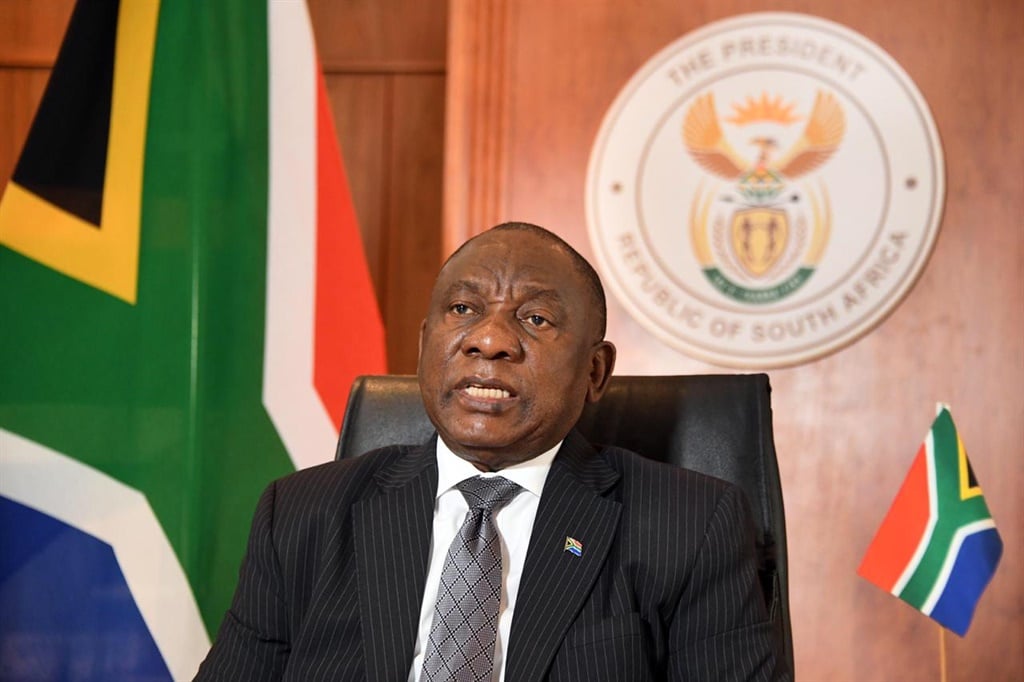


President Cyril Ramaphosa.
As we count the devastating cost the coronavirus pandemic has had on our economy, we must resist the temptation to relegate the critical issue of climate change to the back-burner, writes Cyril Ramaphosa in his weekly newsletter.
Dear Fellow South African,
The coronavirus pandemic has had a dramatic impact on the social, economic, business and industrial landscape of our country and countries around the world.
As we work with our social partners to develop an urgent economic recovery programme, we are determined that we should not merely return to where we were before the pandemic struck. We are instead looking at actions that will build a new, inclusive economy that creates employment and fosters sustainable growth.
An important aspect of this new economy is that it must be able to withstand the effects of climate change. A climate-resilient economy is necessary to protect jobs, ensure the sustainability of our industries, preserve our natural resources and ensure food security.
While the dramatic scaling down of human and industrial activity during Covid-19 lockdowns has been good for the environment and natural ecosystems, these activities are now resuming. The coronavirus pandemic is devastating, but unless we act now, the impact of climate change on humanity will be catastrophic.
Unless we act swiftly to significantly reduce carbon emissions and adapt to the effects of climate change, we will be facing one state of disaster after another for many years to come.
Climate change has long been a measurable reality for South Africa. We have felt its effects in adverse weather conditions, droughts, flooding and rising temperatures.
But climate change is about much more than changing weather patterns. It impacts on water resources, food security, public health, public infrastructure, ecosystems and biodiversity. It affects the most vulnerable in society, who suffer the effects of extreme weather events and the degradation of ecosystems.
As we work to reduce our carbon emissions, we have to build resilience and reduce the vulnerability of communities to climate change. It has to be factored into every aspect of government planning: from water use management to the construction of human settlements, from public transport to infrastructure, from disaster management to energy.
Similarly, nearly every key sector of our economy – from mining to construction, from agriculture to automotive manufacturing – needs to adapt to the effects of climate change.
It is to respond to this massive challenge, that Cabinet last week approved the National Climate Change Adaptation Strategy.
This strategy will guide one important aspect of our climate change response. In line with our commitments under the Paris Agreement to Combat Climate Change, we are moving ahead with both mitigation strategies – to reduce our carbon emissions – and adaptation strategies – to prepare our society for the effects of climate change.
As the Paris Agreement comes fully into force this year, we are committed to meeting our international responsibilities to reduce greenhouse gas emissions. One of the key instruments for this, the Climate Change Bill, is currently under consideration in NEDLAC. We will also be establishing the Presidential Climate Change Commission to coordinate our national response and implementing the carbon tax to encourage companies to reduce their emissions.
While these mitigation measures are implemented, the adaptation strategy calls for a multisectoral response to climate change that brings together government, the private sector, civil society organisations and communities.
Work is already underway in government and in the private sector to respond to climate change, with tangible projects being implemented at both national and provincial government level.
In provinces such as Gauteng and the Western Cape, new low-carbon technologies are being used to power public transport. Thousands of solar water heaters have been installed in public housing. The renewable energy power producer programme plays an important role in increasing the contribution of renewable energy to our electricity supply.
As we build a new economy, we cannot afford to be out of step with international moves towards green growth and green development. Our major trading partners have signalled a move towards ‘carbon border taxes’ to exclude products from those countries that they consider to be violating their climate change commitments.
Our country’s research and development activity has long engaged with the green economy.
We have already made significant advances in the waste and recycling economies. Looking ahead, the Hydrogen SA initiative has built local expertise for the hydrogen economy over a decade, with projects under way to support local manufacturing of fuel cell components. This supports the beneficiation of platinum group metals. The hydrogen economy, when linked to renewable energy, can also position South Africa as a global player in the many applications of green hydrogen.
Climate adaptation can also support infrastructure development and local production. The country can develop its own expertise in areas such as smart grids, e-mobility, smart water and sanitation solutions, ecological infrastructure and broadband connectivity.
The additional benefit of positioning our country as a significant global player in this space is that we will be able to draw on green funding sources and instruments. We already have a National Green Fund, the ‘Working for Water’ and ‘Working on Fire’ public employment programmes and the National Treasury’s Cities Support Programme. All of these support the development of new green industries and the greening of existing initiatives.
As we count the devastating cost the coronavirus pandemic has had on our economy, we must resist the temptation to relegate the critical issue of climate change to the back-burner.
Far from being an ‘added liability’ focused solely on issues of compliance, climate change adaptation is an opportunity to quicken the pace towards a sustainable economy that is just and inclusive.
We need to act now, guided by a common strategy, to combat climate change and build a new, resilient economy.
With best wishes,




